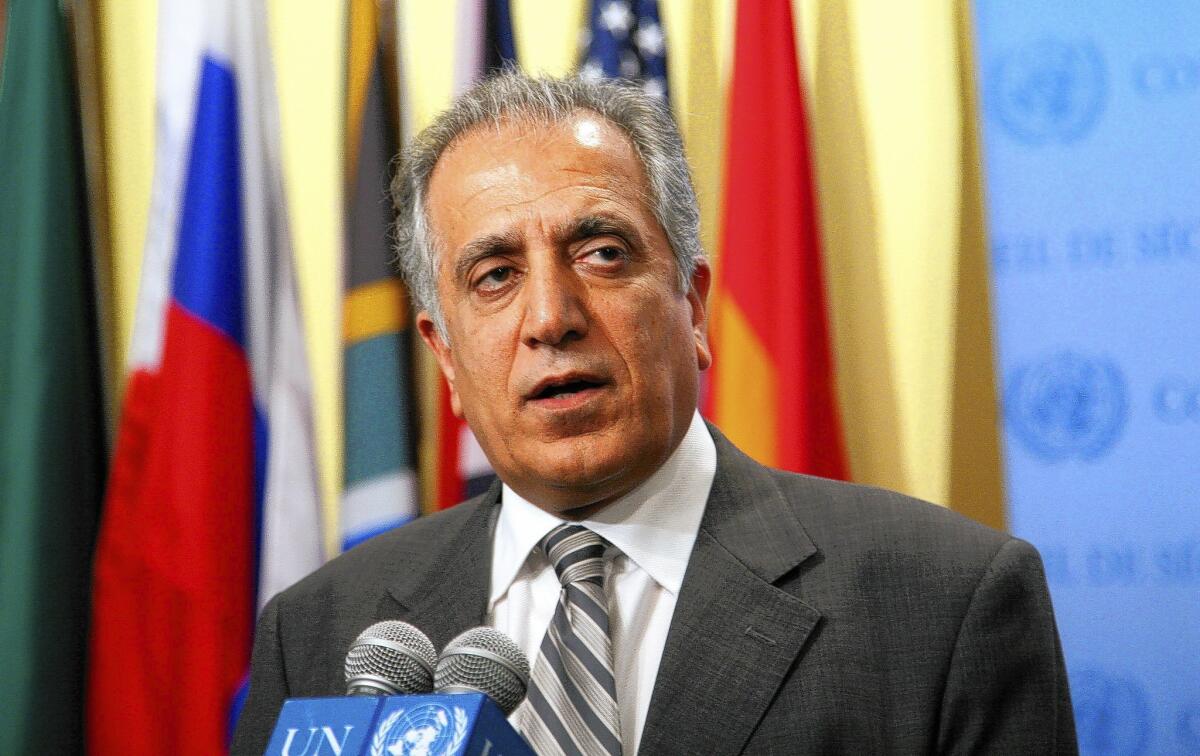Inviting the Taliban to Camp David was a mistake. Suspending talks altogether is a bigger one

- Share via
It’s probably good news that President Trump smothered his over-the-top-as-usual plan for a summit meeting with the Taliban and the president of Afghanistan at the presidential retreat in Camp David. The seeming assumption behind it — that Trump the brilliant dealmaker could get the antagonists to come to terms in a dramatic denouement — was flawed from the start.
But in revealing on Twitter that he had considered and then canceled the summit, Trump went further and suspended negotiations entirely between the United States and the Taliban. That was a mistake.
Those talks have produced a draft agreement under which the U.S. would expedite the withdrawal of some 5,400 troops by next spring and the Taliban would commit not to provide a haven for Al Qaeda or other terrorist groups. Then, U.S. officials hoped, the Taliban would enter direct negotiations with the government in Kabul on a political settlement — one that ideally would commit the Taliban, as a condition of sharing power, to respecting the advancements in women’s rights that have been achieved since it was driven from power. It’s a long shot, to be sure; there’s no guarantee that the Taliban would abide by its promises. But given the U.S.’ limited options after 18 years of engagement in Afghanistan, it’s worth a try.
However, on Monday Trump doubled down, telling reporters that the talks between the U.S. and the Taliban are “dead as far as I’m concerned.”
In his Twitter posts on Saturday, Trump said that he aborted the meeting because the Taliban, in what he described as an attempt to “build false leverage,” had staged a suicide car bomb attack in Kabul that killed 12 people including a U.S. soldier. “I immediately canceled the meeting and called off peace negotiations,” Trump tweeted. “What kind of people would kill so many in order to seemingly strengthen their bargaining position?”
The death of Army Sgt. 1st Class Elis Angel Barreto Ortiz, who was killed in the Kabul bombing, is a tragedy and proof that the Taliban has continued to engage in violence even as its representatives have been negotiating with the U.S. But that could hardly have come as news to the president. Ortiz was the 16th U.S. service member to die in Afghanistan in 2019. The U.S. reached out to the Taliban in 2018 and serious negotiations began in Qatar in January. Despite U.S. fatalities in attacks attributed to the Taliban, the talks have proceeded.
That fuels speculation that the president aborted the summit meeting for other reasons. The Taliban has said that its negotiators would have traveled to the U.S. only after an agreement with the U.S. was announced and would meet only with U.S. officials, which rules out a summit with Afghan President Ashraf Ghani. Canceling the summit also meant that Trump didn’t have to choose between Secretary of State Michael R. Pompeo, who has been supportive of the negotiations, and national security advisor John Bolton, who is more skeptical.
That, in turn, raises another question: whether on this issue, as on other foreign-policy matters such as negotiations with North Korea, the administration has a coherent and consistent view and the competence to achieve it.
Last month Trump said he would reduce the number of U.S. troops in Afghanistan from 14,000 to 8,600 and didn’t link the withdrawal to an agreement with the Taliban. On Sunday Pompeo suggested on “Meet the Press” that there would be no U.S. withdrawal unless the violence in Afghanistan was reduced and the U.S. could be assured that the country wouldn’t again serve as the staging ground for a terrorist attack on the U.S. (American troops were deployed to Afghanistan after the 9/11 attacks because the Taliban government provided a haven for Al Qaeda.)
After almost two decades of U.S. military intervention in Afghanistan, Trump was right to engage the Taliban in negotiations and to seek to reduce the number of U.S. troops. But the fiasco of the canceled summit meeting is a reminder, far from the first one, that this president lacks the competence and consistency necessary to successfully pursue any foreign-policy objective.
More to Read
A cure for the common opinion
Get thought-provoking perspectives with our weekly newsletter.
You may occasionally receive promotional content from the Los Angeles Times.









